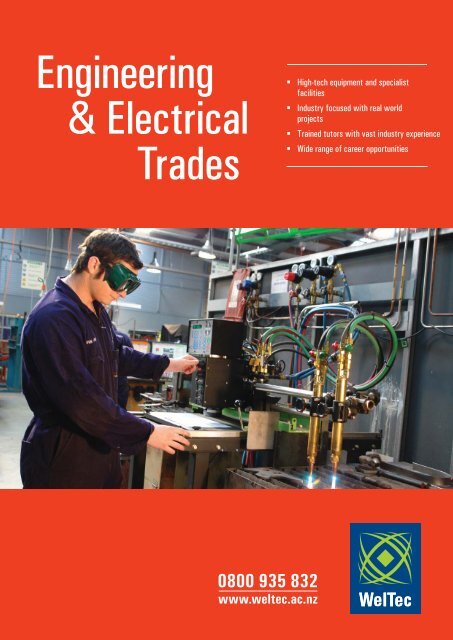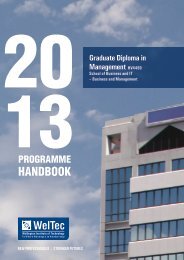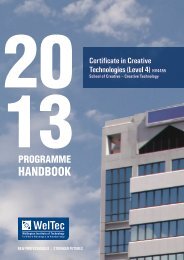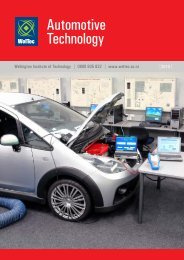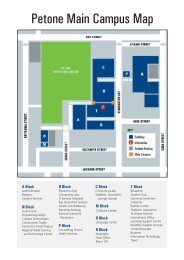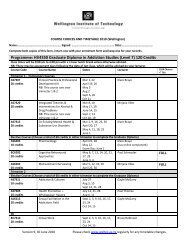Engineering & Electrical Trades - Wellington Institute of Technology
Engineering & Electrical Trades - Wellington Institute of Technology
Engineering & Electrical Trades - Wellington Institute of Technology
You also want an ePaper? Increase the reach of your titles
YUMPU automatically turns print PDFs into web optimized ePapers that Google loves.
1<br />
<strong>Engineering</strong><br />
& <strong>Electrical</strong><br />
<strong>Trades</strong><br />
<br />
<br />
<br />
<br />
High-tech equipment and specialist<br />
facilities<br />
Industry focused with real world<br />
projects<br />
Trained tutors with vast industry experience<br />
Wide range <strong>of</strong> career opportunities<br />
0800 935 832<br />
www.weltec.ac.nz
2<br />
<strong>Engineering</strong> and <strong>Electrical</strong> <strong>Trades</strong> at WelTec<br />
If you want a career in the ever advancing fields <strong>of</strong><br />
engineering and electrical trades, WelTec has a range<br />
<strong>of</strong> programmes to suit you. Electrotechnology and<br />
engineering is all around us, it is a part <strong>of</strong> almost<br />
every aspect <strong>of</strong> daily life. WelTec <strong>of</strong>fers a variety<br />
<strong>of</strong> electrical and engineering programmes to meet<br />
the needs <strong>of</strong> the constantly changing and expanding<br />
industry in New Zealand. With new technologies<br />
emerging, qualified electricians and engineering<br />
technicians are highly sought after.<br />
Our tutors are industry pr<strong>of</strong>essionals, with a wealth<br />
<strong>of</strong> knowledge and experience in the areas they<br />
teach. They work with industry advisory groups and<br />
employers to ensure our programmes are up-to-date<br />
with the latest industry advancements to meet the<br />
needs <strong>of</strong> employers and to ensure that the learning<br />
environment is as close to the real world as it gets.<br />
CONTENTS<br />
3 ENGINEERING TRADES<br />
4 Certificate in Applied Mechanical <strong>Engineering</strong> (Level 4)<br />
Machining Strand<br />
5 Certificate in Applied Mechanical <strong>Engineering</strong> (Level 4)<br />
Fabrication Strand<br />
6 National Certificate in Maintenance and Diagnostics in<br />
Mechanical <strong>Engineering</strong> (Level 5)<br />
6 Part-time <strong>Engineering</strong> Courses<br />
7 Student Success<br />
8 ELECTRICAL TRADES<br />
9 Certificate in <strong>Electrical</strong> and Electronic Industry Skills<br />
(Level 2)<br />
10 National Certificate in <strong>Electrical</strong> <strong>Engineering</strong><br />
(Levels 2, 3 and 4)<br />
10 National Certificate in <strong>Electrical</strong> <strong>Engineering</strong> (Level 5)<br />
11 <strong>Electrical</strong> part-time and short courses<br />
11 GENERAL INFORMATION<br />
11 Apprenticeships<br />
11 Facilities
3<br />
<strong>Engineering</strong> <strong>Trades</strong><br />
What do engineering pr<strong>of</strong>essionals do<br />
There are a wide range <strong>of</strong> career opportunities within the engineering<br />
industry, some <strong>of</strong> which include:<br />
Maintenance Engineer<br />
Maintenance Engineers assist with the design, building and maintenance<br />
<strong>of</strong> machines and equipment. This may include air-conditioning systems,<br />
heating and ventilation units, mechanical devices and power plants.<br />
In this role you may also develop manufacturing quality control systems<br />
by studying and improving the mechanical processes and machinery on<br />
production lines. You may also study ways to improve manufacturing and<br />
energy production and investigate problems and faults with machinery.<br />
Light Fabrication (Sheet metal engineer)<br />
As a sheet metal worker you will be responsible for making, installing<br />
and repairing sheet metal products such as vents, machine guards,<br />
ducting, ro<strong>of</strong> flashings and aircraft parts. Sheet metal engineers are also<br />
called light fabrication engineers.<br />
Welder<br />
Welders, also known as welding fabrication engineers, make, join and<br />
repair metal parts for machinery and equipment. This may include motor<br />
bodies, trailer units, containers, truck frames and bridges.<br />
Fitter/Turner<br />
As a fitter and turner, you will make, fit and repair parts for machines<br />
and related equipment used in factories, mining sites, sawmills, on<br />
farms and in boats.<br />
Toolmaker<br />
Also known as an engineering machinist and toolmaker, you will make<br />
tools and other precision equipment used for mass production in goods<br />
such as vehicles, navigational equipment and household appliances.<br />
Heavy Fabrication (Structural sheet workers)<br />
As a heavy fabrication engineer, you will use thick metal plates, pipes<br />
and shaped pieces <strong>of</strong> metal to make and repair things such as the<br />
framework <strong>of</strong> buildings, ship hulls, bridges, boilers, storage tanks and<br />
cranes.<br />
LEVEL 4 LEVEL 5 LEVEL 6<br />
National Diploma in <strong>Engineering</strong><br />
(Mechanical)<br />
National Certificate in Maintenance<br />
and Diagnostics in Mechanical <strong>Engineering</strong><br />
Certificate in Applied Mechanical<br />
<strong>Engineering</strong><br />
This diagram demonstrates where you<br />
can enter and exit WelTec’s engineering<br />
programmes.<br />
For further study you may progress onto the<br />
National Diploma in <strong>Engineering</strong> (Mechanical)<br />
(Level 6). For further information regarding<br />
these two programmes please refer to our<br />
<strong>Engineering</strong> Technologies brochure or visit<br />
www.weltec.ac.nz
4<br />
Certificate in Applied Mechanical<br />
<strong>Engineering</strong> (Level 4)<br />
The Certificate in Applied Mechanical <strong>Engineering</strong> is designed for<br />
those interested in pursuing a career in mechanical engineering. The<br />
programme is structured in a way that allows you to work while you<br />
learn with the flexibility <strong>of</strong> full-time and part-time study options. It<br />
incorporates qualifications at levels 2, 3 and 4.<br />
MACHINING STRAND<br />
Incorporates the following qualifications:<br />
Certificate in Applied Mechanical <strong>Engineering</strong> (Machining Level 2)<br />
Certificate in Applied Mechanical <strong>Engineering</strong> (Machining Level 3)<br />
National Certificate in Mechanical <strong>Engineering</strong> (Level 2)<br />
National Certificate in Mechanical <strong>Engineering</strong>, Maintenance<br />
<strong>Engineering</strong>, General <strong>Engineering</strong>, Machining, Fitting and Machining<br />
and Toolmaking (Level 4)<br />
Start date and location<br />
Commences in March at our Petone campus.<br />
Machining is the manufacture <strong>of</strong> precision componentry from<br />
engineering materials using a wide variety <strong>of</strong> machining and hand<br />
processes. It also includes plant and equipment maintenance. Level 2 is<br />
common to both machining and fabrication and consists <strong>of</strong> machining,<br />
fabrication and welding. The first two stages consist <strong>of</strong> core machining<br />
subjects. In the third stage you will choose an area <strong>of</strong> specialisation,<br />
either machining and toolmaking or fitting and turning.<br />
Programme content includes:<br />
<strong>Engineering</strong> drawing<br />
Trade calculations<br />
Welding<br />
<strong>Engineering</strong> machining<br />
Fitting<br />
Heat treatment<br />
Communications<br />
Fabrication<br />
Pneumatics & hydraulics<br />
CAD<br />
Drawing<br />
Entry requirements<br />
12 NCEA level 1 credits in both literacy and numeracy.<br />
For applicants who have English as a second language, a minimum IELTS<br />
score <strong>of</strong> 5.5 or equivalent is required.<br />
Where will it take me<br />
You may find work in your chosen field as a fitter and turner,<br />
maintenance engineer or toolmaker or you may progress onto further<br />
study with the National Certificate in Maintenance and Diagnostics in<br />
Mechanical <strong>Engineering</strong> (Level 5) or the National Diploma in <strong>Engineering</strong><br />
(Mechanical) (Level 6).<br />
Programme structure<br />
The programme is structured to allow you to choose between full-time<br />
and part-time study. The final stage <strong>of</strong> the programme is taught in the<br />
evenings part-time in conjunction with work in the industry and block<br />
courses, as illustrated in the table below.<br />
STAGE 1 STAGE 2 STAGE 3<br />
Machining and Toolmaking<br />
Two years part-time<br />
One year full-time or<br />
Two years part-time<br />
Fitting and Turning<br />
Two years part-time<br />
One year full-time or<br />
part-time if already working in<br />
appropriate industry
5<br />
FABRICATION STRAND<br />
You will learn how to cut, shape and join metals to produce components<br />
and structures such as tube, pipe and structural sections as used in the<br />
fabrication industry.<br />
Levels 2 and 3 consist <strong>of</strong> core fabrication subjects. In level four you will<br />
choose an area <strong>of</strong> specialisation; light fabrication, heavy fabrication or<br />
fabrication welding.<br />
Programme content includes:<br />
Safety measurement and hand tools<br />
Welding and cutting<br />
CAD and drawing<br />
Trade calculations<br />
Materials<br />
Communication<br />
Fabrication<br />
Programme structure<br />
The programme is structured to allow you to choose between full and<br />
part-time study. The final stage <strong>of</strong> the programme is taught in the<br />
evenings part-time in conjunction with work in the industry and block<br />
courses, as displayed in the table below.<br />
Incorporates the following qualifications:<br />
National Certificate in <strong>Engineering</strong> - Fabrication (Level 4) with strands<br />
in Heavy Fabrication, Light Fabrication & Welding<br />
Certificate in Applied Mechanical <strong>Engineering</strong> (Fabrication Level 2)<br />
Certificate in Applied Mechanical <strong>Engineering</strong> (Fabrication Level 3)<br />
National Certificate in Mechanical <strong>Engineering</strong> (Level 2)<br />
Start date and location<br />
Commences in March at our Petone campus.<br />
Entry requirements<br />
12 NCEA level 1 credits in both literacy and numeracy.<br />
For applicants who have English as a second language, a minimum IELTS<br />
score <strong>of</strong> 5.5 or equivalent is required.<br />
Where will it take me<br />
You may find work in your chosen field as a structural sheet worker,<br />
sheet metal engineer, or welder or you may progress onto further study<br />
with the National Certificate in Fabrication in Mechanical <strong>Engineering</strong><br />
(Level 5) or the National Diploma in <strong>Engineering</strong> (Mechanical) (Level 6).<br />
STAGE 1 STAGE 2 STAGE 3<br />
Fabrication Light<br />
One year part-time<br />
One year full-time or<br />
Two years part-time<br />
Fabrication Welding<br />
Two years part-time<br />
One year full-time or<br />
part-time if already working in<br />
appropriate industry<br />
Fabrication Heavy<br />
One year part-time
6<br />
National Certificate in Maintenance and<br />
Diagnostics in Mechanical <strong>Engineering</strong><br />
(Level 5)<br />
Building on the knowledge gained in the Certificate in Applied<br />
Mechanical <strong>Engineering</strong> (Level 4), this programme will assist you to<br />
develop advanced skills in the repair and maintenance <strong>of</strong> machinery<br />
used in the engineering and manufacturing industries. On completion<br />
<strong>of</strong> this programme you will be able to apply higher-level skills in the<br />
engineering maintenance and diagnostics industry and to specialise in<br />
areas <strong>of</strong> career interest.<br />
Programme content includes:<br />
Maintenance planning<br />
Working drawings<br />
Heat treatments<br />
Measuring equipment<br />
<strong>Electrical</strong><br />
Production processes<br />
Co-ordinate measuring machine<br />
Supervision<br />
Lubrication<br />
Commisioning plant<br />
Part-time <strong>Engineering</strong> trade<br />
courses<br />
Start date, duration and location<br />
Commences in March and runs for two years part-time in the evenings<br />
at our Petone campus.<br />
Entry requirements<br />
Successful completion <strong>of</strong> the Certificate in Applied Mechanical<br />
<strong>Engineering</strong> (Level 4) or an equivalent qualification.<br />
For applicants who have English as a second language a minimum IELTS<br />
score <strong>of</strong> 5.5 or equivalent is required.<br />
Where will it take me<br />
This qualification opens up a range <strong>of</strong> options in foreman or workshop<br />
management positions within the engineering industry. You can<br />
also progress onto further study with the Diploma in <strong>Engineering</strong><br />
(Mechanical) (Level 6).<br />
We <strong>of</strong>fer a range <strong>of</strong> part-time courses in welding,<br />
mechanical engineering for those wanting to enter the<br />
industry, up-skill or take a course for self-interest. The<br />
programmes are run in the evenings and on weekends so<br />
you can still work while you learn.<br />
Mig/Tig Welding<br />
Learn how to set up welding and cutting equipment, MIG<br />
welding techniques, TIG welding techniques, how to<br />
recognise and repair the most common welding faults and<br />
basic distortion control techniques.<br />
Runs for three hours per week (in the evening) for 12 weeks<br />
part-time in the evenings at our Petone campus.<br />
Machine Shop Practice<br />
Broaden your skills in turning, milling, grinding,<br />
measurement and heat treatment. Suitable for tradespeople<br />
or experienced hobby metal workers.<br />
Runs for three hours per week (in the evening) for 12 weeks<br />
part-time in the evenings at our Petone campus.<br />
Introduction to Computer Numerical<br />
Control <strong>of</strong> Machine Tools (CNC)<br />
Provides instruction for CNC lathes and machining centres.<br />
Programming will be done in both NC and APT languages.<br />
You will have access to WelTec’s 7-tool FANUC CNC mil,<br />
OKUMA LB9 lathe and EDGECAM s<strong>of</strong>tware programme.<br />
Runs for two hours per week (in the evening) for 12 weeks<br />
part-time in the evenings at our Petone campus.
7<br />
Student success<br />
Ben Davidge<br />
Certificate in Mechanical <strong>Engineering</strong><br />
Ben Davidge was one <strong>of</strong> those people that knew what his career path<br />
was from the outset. A former Hutt Valley High Student, Ben has always<br />
had a keen focus on technology.<br />
From school he went straight into the Certificate in Mechanical<br />
<strong>Engineering</strong> at WelTec. "The certificate is hands-on and practical -<br />
creating parts, drawing and some design. I branched <strong>of</strong>f into toolmaking<br />
but there were also options to go into fitting and turning or maintenance<br />
and diagnostics."<br />
"I found that there wasn’t enough time in the day – I just wanted to stay<br />
in class as long as I could. I really enjoyed the projects – making parts<br />
from drawings. It was all based on the workshop environment which I<br />
enjoyed and the theory was there to back up the practical component."<br />
He’s turned his passion into a pr<strong>of</strong>ession working for Agmar Tools 2000<br />
Ltd in Lower Hutt. Ben is thoroughly enjoying his role. "The type <strong>of</strong> work<br />
we do at Agmar is really specialised. People think I make hammers for<br />
a living it’s a lot different that that – we would make the machines that<br />
make hammer. A company might come to us with a new part made out<br />
<strong>of</strong> plastic that they want to put out to the market - we make the parts<br />
and process to create the product."<br />
Mark Fitfield <strong>of</strong> Agmar Tools has been impressed with Ben. "He’s very<br />
bright and articulate. We’re very proud to have him on staff. It’s hard<br />
to find top calibre people like this and so we think that we are very<br />
lucky."<br />
Manu Pouajen-Blakiston<br />
Core Mechanical <strong>Engineering</strong> <strong>Trades</strong> Skills<br />
(now the Certificate in Applied Mechanical<br />
<strong>Engineering</strong>)<br />
Manu Pouajen-Blakiston was encouraged to try an<br />
apprenticeship, and so he decided to enrol in the Core<br />
Mechanical <strong>Engineering</strong> <strong>Trades</strong> Skills (now called the<br />
Certificate in Applied Mechanical <strong>Engineering</strong>) pre trade course<br />
at WelTec. "It seemed like a straight-forward foot in the door<br />
rather than doing a degree. It was an excellent course, I’ve<br />
always been good with my hands but I had never considered<br />
engineering."<br />
The WelTec pre-trade course suited Manu’s hands on<br />
approach. "WelTec is really practical, it’s a totally different<br />
experience to school. I was learning new skills and it was<br />
exactly what I wanted to do". He found the tutors were a<br />
tremendous help throughout his studies "the tutors were the<br />
best part. Having tutors that have already been in trades was<br />
invaluable, they know the industry really well".<br />
Manu says his qualification prepared him well for the<br />
industry; he even received assistance from his apprenticeship<br />
coordinator in seeking a job. Manu couldn’t be happier with<br />
the job he landed straight out <strong>of</strong> study. He is currently working<br />
for Victoria University as a Mechanical Workshop Technician<br />
where he is responsible for building and maintaining scientific<br />
equipment. He is enjoying the variation his role provides and is<br />
planning on further study, possibly in physics and engineering.<br />
Manu says the trade industry is an excellent career choice.<br />
There is currently a significant skills shortage and there are<br />
simply not enough Pacific Islanders in the industry. "I can’t<br />
believe more people don’t get into the trades. Pacific people<br />
haven’t been exposed enough to the industry but it is so easy<br />
to start a career in the trades and there is so much work out<br />
there."
8<br />
<strong>Electrical</strong> <strong>Trades</strong><br />
What do electrical pr<strong>of</strong>essionals do<br />
There are many different and varied roles within this field, ranging from<br />
repairing and installing electronic and electrical equipment to designing<br />
and producing systems and equipment. The industry <strong>of</strong>fers a broad<br />
range <strong>of</strong> careers, including:<br />
Electricians<br />
No day will be the same, working as an electrician. You will get to<br />
work in a variety <strong>of</strong> settings, on a range <strong>of</strong> tasks, such as installing,<br />
maintaining and repairing electrical wiring and electrical and electronic<br />
equipment.<br />
Telecommunications <strong>Engineering</strong> Technicians<br />
The role <strong>of</strong> a telecommunications technician is similar to an electrical<br />
engineering technician, however a focus is placed on communication<br />
equipment, your work will involve installing, maintaining and repairing<br />
electronic information communication equipment.<br />
Electronic <strong>Engineering</strong> Technicians<br />
As an electronic engineering technician, you will service, maintain and<br />
test electronic systems and equipment such as computers, televisions<br />
and telecommunications equipment. You may also help design and<br />
produce electronic equipment and systems.<br />
LEVEL 2 LEVEL 3 LEVEL 4 LEVEL 5<br />
National Certificate in<br />
<strong>Electrical</strong> <strong>Engineering</strong><br />
National Certificate in<br />
<strong>Electrical</strong> <strong>Engineering</strong><br />
National Certificate in<br />
<strong>Electrical</strong> <strong>Engineering</strong><br />
National Certificate in<br />
<strong>Electrical</strong> <strong>Engineering</strong><br />
Certificate in <strong>Electrical</strong> and<br />
Electronic Industry Skills<br />
This diagram demonstrates where<br />
you can enter and exit WelTec’s<br />
electrical programmes.<br />
For further study you may progress<br />
onto the National Diploma in<br />
<strong>Engineering</strong> (Electrotechnology)<br />
(Level 6). For further information<br />
regarding these two programmes<br />
please refer to our <strong>Engineering</strong><br />
Technologies brochure.
9<br />
Certificate in <strong>Electrical</strong> and Electronic<br />
Industry Skills (Level 2)<br />
Incorporates the National Certificate in <strong>Electrical</strong> <strong>Engineering</strong> (Level 2)<br />
Designed for those wanting to pursue a career as an electrician,<br />
appliance service technician, electrical fitter or electronics<br />
serviceperson, this programme will provide you with broad based<br />
training in all aspects <strong>of</strong> the industry. The programme includes a large<br />
practical component, including work experience placements.<br />
Programme content includes:<br />
Practical and safe use <strong>of</strong> instruments and tools<br />
<strong>Electrical</strong> and electronics theory and practice<br />
Basic training in gas and electric arc welding, mechanical engineering<br />
and carpentry<br />
Operation <strong>of</strong> commonly used electrical and electronic components<br />
<strong>Electrical</strong> drawing<br />
Domestic wiring and circuitry<br />
<strong>Electrical</strong> safety<br />
Earthing<br />
Electronic components<br />
Power supplies and digital logic<br />
Computer skills<br />
Work experience<br />
This programme will also prepare you to sit the <strong>Electrical</strong> Service<br />
Technician Certificate Paper A (EST A) examination and practical<br />
assessment.<br />
Entry requirements<br />
Open entry. The programme is best suited to those who can perform<br />
basic mathematical functions and have a reasonable standard <strong>of</strong> English.<br />
All applicants will be required to attend an interview.<br />
For applicants who have English as a second language, a minimum IELTS<br />
score <strong>of</strong> 5.00 or equivalent is required.<br />
Start date, duration and location<br />
Commences in March and runs for one year full-time at our Petone<br />
campus.<br />
Where will it take me<br />
You may find employment as an apprentice electrician, security<br />
installer, electronic serviceperson or electronic salesperson or<br />
progress onto further study with the National Diploma in <strong>Engineering</strong><br />
(Electrotechnology).<br />
Helen O’Rourke<br />
National Certificate in <strong>Electrical</strong> <strong>Engineering</strong><br />
Helen O'Rourke, is wiring up a career in electrical<br />
engineering. Helen has undertaken an apprenticeship with<br />
Newpower <strong>Electrical</strong>, a large electrical contracting company.<br />
The company <strong>of</strong>fered her a job following an interview<br />
arranged by her tutor at WelTec.<br />
"I wanted to do something practical, not a job where I’d<br />
be sitting down all day," says Helen. "I enjoy working on<br />
different construction sites and being part <strong>of</strong> making a<br />
building happen. The electrics bring it to life; you just need<br />
the people to turn it all on."<br />
Outside her work and study Helen plays drums in a rock band<br />
and records music in her home studio where her aptitude<br />
with technology also comes in handy.<br />
In the not too distant future Helen is looking forward to<br />
travelling and working overseas once she has completed her<br />
qualification. "When I’ve got my electrical ticket I want to go<br />
to England, then travel the world," she says. Helen expects<br />
that her qualification will stand her in good stead for work at<br />
home and overseas.
10<br />
National Certificate in <strong>Electrical</strong><br />
<strong>Engineering</strong> (Levels 2, 3 and 4)<br />
Evening classes and block courses<br />
To become a registered electrician, you need to complete levels 2, 3<br />
and 4. These are undertaken in conjunction with employment as an<br />
apprentice electrician. Level 2 can be completed before commencing<br />
an apprenticeship by completing WelTec's Certificate in <strong>Electrical</strong> and<br />
Electronic Industry Skills.<br />
Programme content includes:<br />
Electricity and magnetism<br />
<strong>Electrical</strong> diagrams<br />
Mathematics and mechanics<br />
<strong>Electrical</strong> instruments and measurements<br />
Installing flexible cords and cables<br />
Soldering <strong>of</strong> wires and components<br />
Safe working practices, testing, first aid and CPR<br />
Employment rights and responsibilities<br />
Knowledge and application <strong>of</strong> relevant legislation, codes <strong>of</strong><br />
practice and standards<br />
Knowledge <strong>of</strong> electrical theory, concepts and trade practice<br />
Competence in the practical skills <strong>of</strong> an electrician<br />
National Certificate in <strong>Electrical</strong><br />
<strong>Engineering</strong> (Level 5)<br />
Evening classes or block course<br />
Following on from the National Certificate in <strong>Electrical</strong> <strong>Engineering</strong> (Level 4),<br />
this programme will introduce you to small business management and<br />
electrical inspection. It will help to prepare you for work in a variety <strong>of</strong><br />
roles within the electrical contracting and industrial sectors.<br />
Programme content includes:<br />
<strong>Electrical</strong> inspection<br />
Business management<br />
Circuit protection<br />
Advanced three phase power<br />
Switchgear and switchboards<br />
<strong>Electrical</strong> installation<br />
Lighting design<br />
Preventative maintenance<br />
Start date, duration and location<br />
Evening classes commence in February and run for two years part-time<br />
at our Petone campus. This programme may also be <strong>of</strong>fered as a block<br />
course.<br />
Start date and location<br />
Each level is completed part-time over one year commencing in February<br />
at our Petone campus. The programme consists <strong>of</strong> four hours study per<br />
week (taught over one or two evenings) and a one or two week block<br />
course.<br />
A six-week block course is also <strong>of</strong>fered at each level as an alternative to<br />
the evening class programme.<br />
The National Certificates in <strong>Electrical</strong> <strong>Engineering</strong> (Levels 2,<br />
3, and 4) are run in conjunction with the Electrotechnology<br />
Industry Training Organisation (ETITO).
11<br />
<strong>Electrical</strong> part-time and short courses<br />
We also <strong>of</strong>fer a range <strong>of</strong> part-time and short<br />
electrotechnology courses. These include:<br />
<strong>Electrical</strong> Service Technician Certificates<br />
(EST A & EST B)<br />
Gain the level <strong>of</strong> expertise required by the <strong>Electrical</strong> Workers<br />
Registration Board (EWRB) to sit your theory exam and practical<br />
assessment.<br />
EST A provides the skills to service plug in appliances up to<br />
230V. Offered as a one week block course for those with some<br />
prior experience and on Saturdays for 18 weeks for those with<br />
none.<br />
EST B provides the additional skills to service three phase<br />
appliances that are permanently connected to the power supply<br />
up to 400V (you must complete EST A before doing EST B).<br />
Offered as a one week block course for those with some prior<br />
experience and on Saturdays for 18 weeks for those with none.<br />
Practising Licence for <strong>Electrical</strong> Workers<br />
For electrical workers wishing to renew their practising licence.<br />
Course covers safe working practices, testing, first aid and CPR.<br />
One day refresher courses are <strong>of</strong>fered throughout the year.<br />
General Information<br />
Apprenticeships<br />
An apprenticeship is an on-the-job training scheme, which allows you to<br />
earn while you learn and get qualified. An electrical apprenticeship takes<br />
approximately three years to complete. Most <strong>of</strong> your training will take<br />
place at work, with the rest at WelTec or another training provider. While<br />
you can get your apprenticeship straight out <strong>of</strong> school, studying WelTec's<br />
Certificate in <strong>Electrical</strong> and Electronic Industry Skills will count for a year<br />
<strong>of</strong> your apprenticeship and may assist you to get a job. You will also learn<br />
valuable additional skills to enhance your electrical career.<br />
Facilities<br />
Taught at our Petone campus, you will have access to a range <strong>of</strong><br />
specialised facilities including a soldering lab, industrial electronics lab,<br />
mechatronics lab, machine room and electrical workshop. You’ll be able<br />
to access specialised equipment including a mechatronics production<br />
and automation lab, a 2 1/2 axis CNC Machining Centre, a CNC Milling<br />
Machine, lathes, grinders and CAD and Solidworks computer labs.<br />
You will also have access to WelTec’s state <strong>of</strong> the art visualisation<br />
and realisation (manufacturing) equipment including a 3D scanner and<br />
digitiser, Z Corp prototyper, FDM prototyper, CNC Daewoo four axis<br />
machining centre and a vacuum casting facility.<br />
<strong>Electrical</strong> Inspectors Certificate<br />
Aimed at registered electricians who wish to up-skill or upgrade<br />
their registration. Can also be used as a regulations update for<br />
electrical workers. Available as a two week block course or one<br />
evening per week for 18 weeks.<br />
<strong>Electrical</strong> Trade Revision Courses<br />
Assists you to prepare for the electrician theory and electrician<br />
regulations examinations, as well as the practical assessments<br />
for stages one, two and three. Courses are <strong>of</strong>fered just before<br />
the external examinations.<br />
National Certificate in Telecommunications<br />
(Level 4)<br />
Offered by distance learning and runs for three years part-time.<br />
National Certificate in Electronic Security<br />
(Installers) (Level 3)<br />
Offered as a combination <strong>of</strong> distance learning, block courses<br />
and evening classes and runs for two years part-time study.<br />
DISCLAIMER:<br />
The information contained in this booklet is correct at the time <strong>of</strong> printing. However programmes and courses are<br />
subject to change. In some cases programmes are subject to final approval and the number <strong>of</strong> enrolment applications.
12<br />
Private Bag 39803<br />
<strong>Wellington</strong> Mail Centre, Lower Hutt 5045<br />
Telephone 64 (4) 9202 400<br />
Facsimile 64 (4) 9202 401<br />
0800 935 832<br />
www.weltec.ac.nz<br />
Nov 08


